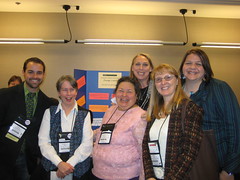The Libraries in Medical Education (LiME) informal meeting convened for their inaugural meeting today from 9-10am at MLA’s Annual Meeting in Chicago. For librarians involved in medical education, this is a group of which you should be aware and involved. From the standing room only size of the group, I’d say that word is out!
How does LiME work? It’s actually not affiliated with MLA, but in fact a part of the AAMC’s GEA (Group on Educational Affairs). The AAMC is a nonprofit group of medical schools, teaching hospitals, and academic societies. It provides assistance for members in the areas of education, research, and more. Further information on the AAMC can be found here.
AAMC’s Group on Educational Affairs is open to individuals with professional responsibility in medical student, resident, and continuing medical education, designated by deans, hospital directors, or academic societies. GEA is organized in four regions: Southern, Central, Northeast, and Western. LiME functions as a SIG (special interest group) to GEA (can I throw another acronym in there?) within the various sections, thus enabling a space for instructional librarians to share and participate with others involved with medical education in their region. What’s even better: there’s no membership fee to become a member. If your institution is a member of the AAMC, you can join. Contact your regional leaders for more info on that from the links below.
What are instructional librarians doing in their regions? Here’s a quick snapshot (& please, if I’m wrong here about anything comment & correct me!):
The Central GEA (CGEA) LiME SIG was established in 2005, and now has about 79 members representing 79 organizations. One of the group member’s poster sessions won a research award at the regional conference last year. They are moving forward and very well organized. Check out (& join!) their Facebook group – it’s open to anyone, not just their region. A SIG website is coming soon. Meanwhile, read more about the CGEA in general here: http://cgea.net/index.htm
The Northeast GEA (NEGEA) LiME SIG has a blog and a webpage. This online poster session provides an overview of what they’re all about. I love their icon! Hopefully all of the chapter SIGs can adopt this so there is a cohesive brand for others to associate with LiME.

The Southern GEA LiME SIG is under formation, having just submitted their paperwork to become an official SIG of the Southern region. LIbrarians in the SCC region of MLA take note: you are considered Southern chapter in the AAMC. The group has just started a blog. The 2009 SGEA conference will be in New Orleans next year, so this is a great time to get involved.
The Western region of LiME just had their inaugural meeting, with 9 members attending. Not only is the Western LiME an official SIG of WGEA, they even have a librarian board member. They plan to develop a baseline for research in the region. As you can see from the AAMC’s WGEA page, a website for Western LiME is coming very soon.
Highlights of the meeting
LiME sections are getting busy! A vote was taken on the official name — librarians or libraries in medical education? Libraries in Medical Education was a resounding win. We also discussed MERC certification and how LiME can get involved. Lauren Maggio discussed an AAHSL/LiME Task Force and some research projects they’re doing. AAHSL also granted some webspace for LiME on their site, a link is coming soon. Julie Solllenberger from the Univ. of Rochester is the AAHSL liaison and also developing a research agenda with the Educational Research Task Force. She had a poster session today (#39) that should be up until tomorrow afternoon called “An emerging alliance: Librarians collaborating with Colleagues in Medical and Health CAre Education”, if you want to check it out. Rikke Ogawa from UCLA Biomed library also mentioned a recent post on the western region discussion list on promoting non-librarian membership in the SIGs–more food for thought. There was also talk of working with the AAMC on KERMIT, a curriculum management database with big potential.
Can you believe we covered all of this and more in an hour long informal meeting? It will be interesting to watch the future development of this group. LiME is not affiliated with MLA just yet, but with libraries increasingly playing a major role in the education and development of information literacy skills in medical programs and beyond, perhaps they will soon be. Regardless, librarians at LSUHSC will be at SGEA next April, hopefully presenting on what we at do with our medical student instruction and department of medical education research. Maybe we’ll see you there!




 myLSUHSC
myLSUHSC


